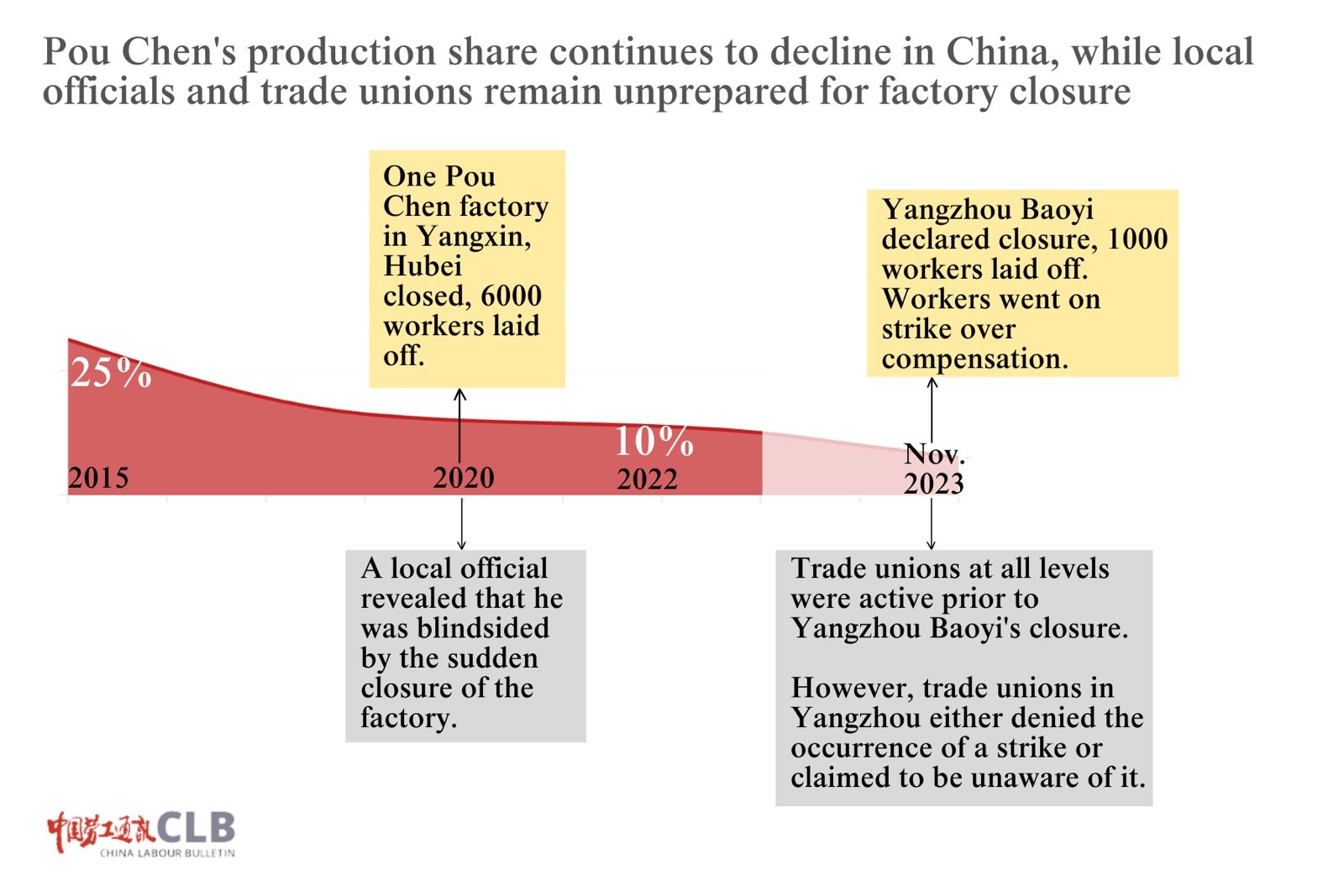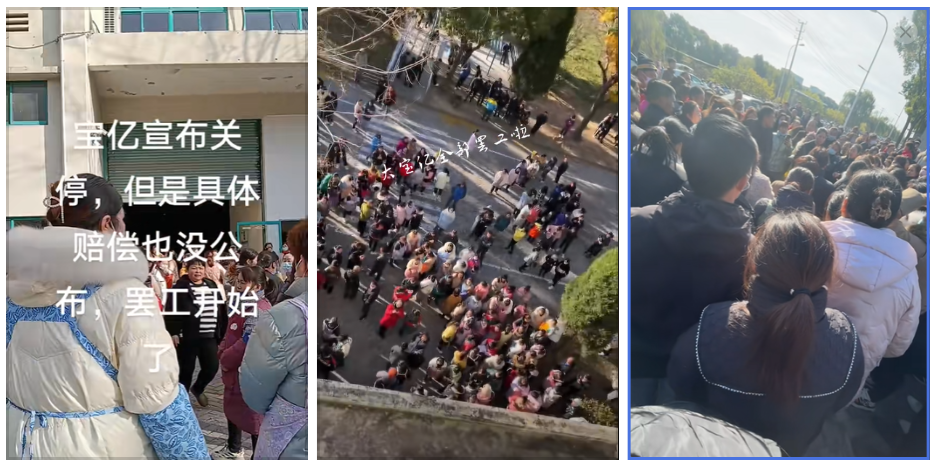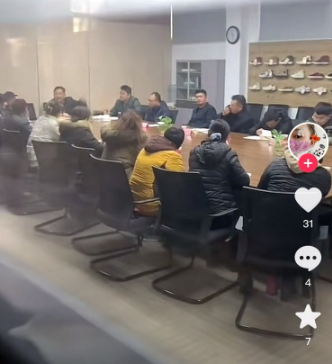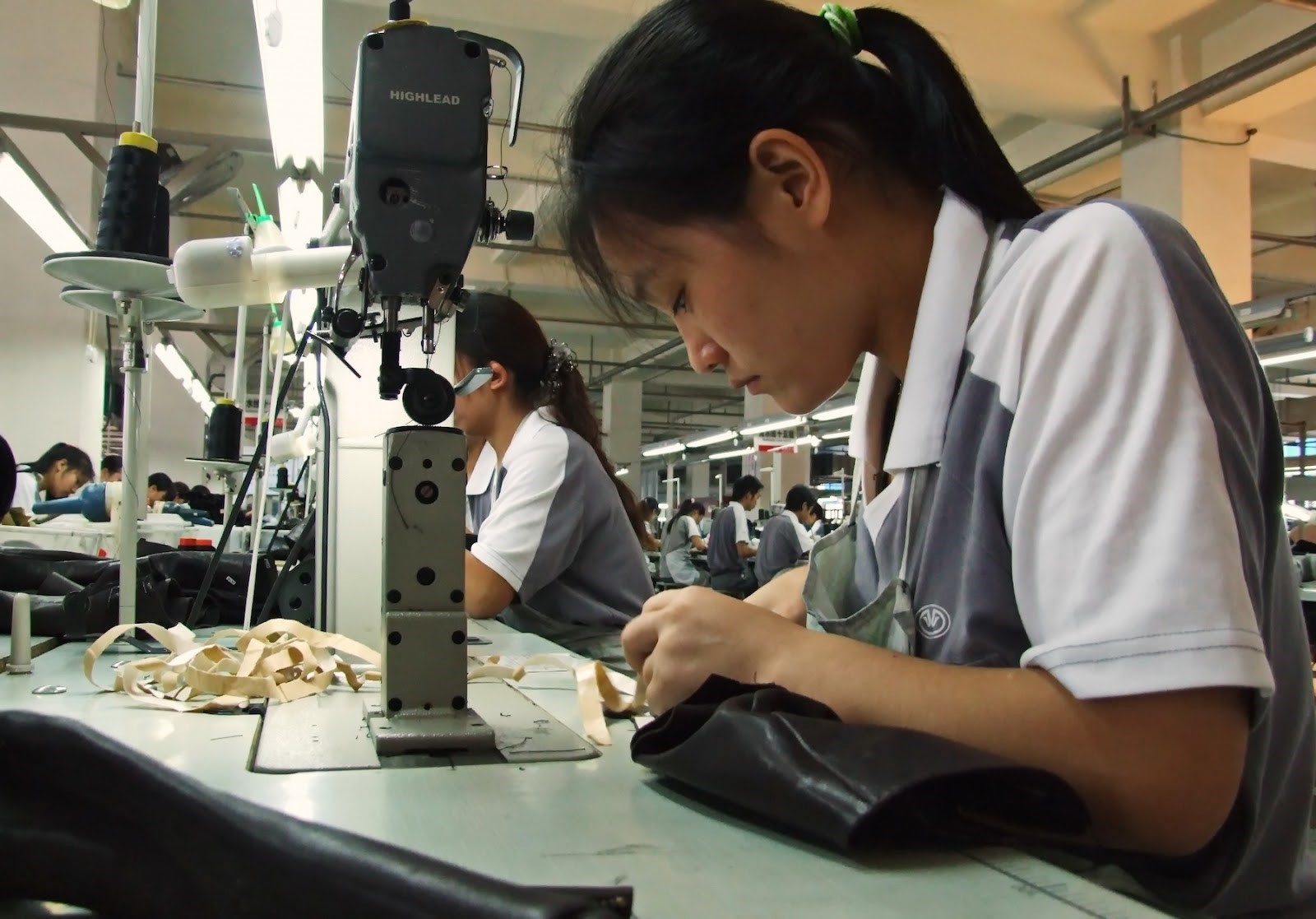- Pou Chen is the world No.1 shoe supplier and employed over 31 thousand workers across Asian countries in 2022.
- China Labour Bulletin (CLB) reported that in one of its subsidiaries Yangzhou Baoyi, workers went on strike upon sudden closure, as the company shifted its supply chain from China to other regions (see Yangzhou Baoyi article).
- CLB conducted a further investigation into the actions and reactions of local governments and trade unions. The investigation revealed that they were unprepared for the retreat of foreign direct investment, leaving workers without adequate protections.
- CLB is calling on the official trade union to set up regular communication channels with companies, so as to improve representation for workers during factory closures and relocations. Foreign brands should also actively monitor the situation and ensure their suppliers comply with the law.
 It is not the first time Pou Chen, the Taiwanese shoe company, announced sudden factory closures and caused chaos. Pou Chen is the largest shoe manufacturer, supplying to international brands such as Nike, Adidas, Asics, New Balance, Timberland and Salomon. As the company shifts its supply chain out of China, protests and strikes were recorded in their factories.
It is not the first time Pou Chen, the Taiwanese shoe company, announced sudden factory closures and caused chaos. Pou Chen is the largest shoe manufacturer, supplying to international brands such as Nike, Adidas, Asics, New Balance, Timberland and Salomon. As the company shifts its supply chain out of China, protests and strikes were recorded in their factories.
During the pandemic in 2020, a Chinese government official in Yangxin, Hubei was preparing to resume the company’s factory production, only to witness Pou Chen announcing the factory’s closure. Pou Chen used to employ over 10 thousand employees in Yangxin, Hubei, a town which is famous for shoe making and even has a road named after the company. In the official’s notebook was a short timeline recording how Pou Chen closed its factory:
On 27 February, Pou Chen planned to resume production after the Spring Festival.
On 16 March, we negotiated face-to-face with Pou Chen, also helping the Taiwanese managers enter into China.
On 24 March, we checked the procedures of preventing and controlling pandemic, fixing 8 April as the date for resuming production.
On 26 March, we were told that the Yangxin factory would be closed.
On 31 March, Pou Chen issued an official notice of closing up and firing employees.
Three years later, Pou Chen announced factory closures in Yangzhou, Jiangsu - this time two factories were to close within a month. On 14 November, Yangzhou Baoyi - Gushi branch reported closure after only four years of operation. The main factory shortly followed suit to declare closure on 29 November. A strike broke out after the management said the calculation of layoff compensation would only be revealed in late December, forcing a government lawyer to intervene two days later. In the end, the company issued a supplementary notice to respond to workers’ demands and promised to abide by the law. More than a thousand workers were laid off.

Strike scene at the Yangzhou Baoyi factory, as collected from workers’ online posts
Pou Chen managed to close its factories by giving a month’s notice, leaving workers without jobs, many of whom had to return to their hometowns. Local government officials were puzzled as Pou Chen abruptly closed the factories; they still had to clean up the mess, especially when workers went on protest. The role of the government quickly shifted to “maintaining stability”, while Pou Chen had the freedom to come and go as it pleased.
In this article, CLB will focus on the actions of government bureaus and the official trade union in a factory relocation. Contrary to the belief that the Chinese government conspired with the factories to cheat on workers, the local government officials were usually ignorant of the factory decisions and were compelled to deal with the aftermath, with workers losing their jobs and receiving substandard layoff compensation.
China’s local governments and trade unions are unprepared for foreign direct investment retreat, leaving workers without protections
In 2022, the investment from Taiwanese companies to south and southeast Asian countries exceeded that in mainland China for the first time. In 2023, the foreign direct investment into China recorded the lowest increase since the 1990s. These changes in factory investments led to a wave of factory closures and relocations a year later. According to the CLB’s Strike Map, of the 438 cases of manufacturing protests in 2023, 171 cases were related to closures or relocations.
Workers were often dismissed on short notice. In the Yangzhou Baoyi case mentioned above, only a month’s notice was issued. Knowing they have limited time to claim overdue payments and make companies respond, Chinese workers often resorted to strikes to increase their leverage (see more in CLB’s case stories).
After a strike occurs, government officials and sometimes official unions mediate between the workers and company management. The government typically takes a neutral stance, aiming to "maintain social stability." While they may pressure companies to meet some of the workers' demands, they also pressure workers to make concessions and end the strike. Workers' compensation often falls short of legal requirements.

Baoyi workers attend a negotiation about their compensation plan. Source: CLB Strike Map (Douyin)
CLB's recent investigation into the Yangzhou Baoyi case revealed that the local government was not prepared for the factory relocation. It was found that the government continued with its typical routine of work, despite the company's statistics indicating a long-standing intention to retreat from China.
If local governments are aware of trends in factory relocations and take precautionary measures, there will likely be better protection of labour rights and fewer instances of labour conflicts.
In the Yangzhou Baoyi case, Pou Chen has long started to relocate to south Asian countries, with its share of production in China dropping to less than 25% in 2016. Local government seemed to be unaware of the trend. That year, the company was granted the award of “best employer” in Yangzhou city. In the article that introduced the two award winners, Baoyi was hailed as the “empire of shoe production”, employing more than three thousand workers in Yangzhou.
In May 2023, half a year before the final closure of the factory, Pou Chen released its 2022 annual report, revealing that the share of shipments from mainland factories had dropped to 10% (2% lower than the previous year). This should serve as an important signal for the Yangzhou government, given that the Baoyi factory employed thousands of workers, and other Pou Chen factories in China were closing in the last few years. However, both the government and the official trade union were treating Baoyi as usual. That month, the Yangzhou Municipal Federation of Trade Unions was helping the Baoyi factory publish a recruitment advertisement through its official account.
Zhang Xiaojun, deputy director at the Taxation branch of the Yangzhou Economic and Technological Development Zone, made a special trip to Yangzhou Baoyi in May 2023 as well. During his trip, Zhang "had discussions with the company management, visited the shoemaking process, and learned in detail about the company’s operating conditions." As an “Advance Worker” in Jiangsu, if Zhang considered the fact that Pou Chen has been retreating from China and inquired about the factory’s future plans in Yangzhou, probably he would have learned about the reasons or possible factors that prevented the factory from staying. In that case, either the district union or government officials could make preparations six months ahead of the factory relocation. However, it seemed that the official did not seize the opportunity to look into the future strategy of Yangzhou Baoyi.

Photograph: Alexander Chizhenok / Shutterstock.com
Trade union’s lacklustre response in Yangzhou Baoyi case
Had the official trade unions looked into workers’ conditions in Pou Chen and inquired about company plans, they would also be prepared to stand up to defend workers’ rights.
Trade unions at all levels in Yangzhou and Jiangsu were active before Yangzhou Baoyi declared closure in November 2023. For example, the vice chairman of the Jiangsu Provincial Trade Union chaired a meeting in Yangzhou on 10 November, urging unions to "maintain the stability of employment and establish harmonious labour relationships." The Yangzhou Federation of Trade Unions followed up on 14 November, by launching a collective bargaining session for the winter season, which was attended by over 130 participants, including representatives from enterprises. Two days later, another union meeting took place in Yangzhou, emphasising that the "Yangzhou experience" should be shared along with the top official's speech.
However, when China Labour Bulletin phoned several levels of unions in Yangzhou after the Baoyi workers went on strike, they were in general not supportive of the workers. The trade union at the Yangzhou Economic Special Zone denied there was a strike and hung up. The Yangzhou Municipal Federation of Trade Unions was not aware of the strike and knew nothing about the negotiation as well.
China Labour Bulletin was not able to contact the enterprise union at Baoyi, but public information and court files can still shed some light on their attitude to the workers.
As early as 2012, the enterprise trade union has already been present in several court cases, especially cases involving employees suing the company. In a case in 2014, the enterprise union appeared to support the company in firing an employee. The company, sued by a worker for illegal termination of a labour contract, argued that the termination was made after a meeting “with the review and consent of the labour union.” The company provided the court with evidence that “the union agreed with the company decision” and refused to pay compensation.
In another case in 2018, a senior worker felt he faced retaliation after "reporting eight suggestions to the company" and was reprimanded by his supervisor. The company suggested that the worker was planning to initiate a strike. The company worked with the local police to dissuade him, ultimately dismissing the worker. The company also cited the approval of the trade union. The court ruled that the employee would receive no compensation, stating that he should report the company's wrongdoings to the enterprise trade union.
These cases suggest that the enterprise union in Yangzhou Baoyi is not supportive of the workers. Instead of representing the workers' interests, it appears to align more with the company in dismissing workers.
Suggestions for unions, enterprises and downstream brands
We can observe a vicious cycle in the Yangzhou Baoyi case. Government bureaus and the official trade unions adhere to their routine work and are unprepared when enterprises relocate and violate workers' rights. Workers go on strike after discovering their rights have been infringed, only to have the local government pacify them to maintain stability. In the end, enterprises are protected and allowed to leave, while workers lose their jobs, and the government and local trade unions lose the trust of the workers.
There were missed opportunities to prevent or better handle the situation—if the local government had maintained its third-party role and if the trade union had fulfilled its representative duties. While enterprises have the freedom to make business decisions, it is clear that these decisions greatly affect workers and local employment. In instances where Chinese workers lack representation, the official trade union should intervene to help them voice their concerns. Additionally, the government should establish a positive and interactive relationship with enterprises to ensure the smooth operation of the manufacturing supply chain, as well as to guarantee workers have adequate income and a satisfactory quality of life in the city.
Factories, their parent companies, and downstream brands should also play a role in ensuring responsible disengagement. It is crucial that factories and their parent companies announce their relocations or closures directly to workers, rather than just posting on websites or addressing investors. The announcement should reserve time to arrange job relocation, calculate compensation, and proceed with any outstanding payments. Such an approach would demonstrate the companies' commitment to upholding their legal responsibilities and would give workers sufficient time to voice their concerns through negotiations, potentially facilitated by the union.
If a factory is unable to meet legal requirements due to insufficient assets, it should seek assistance from its parent companies and downstream brands. Furthermore, parent companies and downstream brands should monitor supplier factories to ensure compliance with local labour laws and international labour standards.
